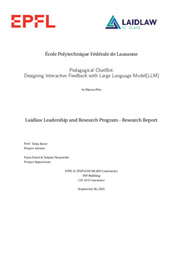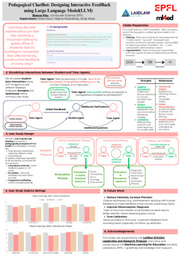Can AI Tutors actually teach?
Why we need feedback
In education research, feedback has long been recognized as one of the most powerful influences on learning. Education researcher John Hattie reviewed hundreds of large-scale studies on what helps students learn, and found that high-quality feedback was one of the most powerful influences on learning. But feedback isn’t just a score, a grade, or a tick mark. Other research has shown that feedback, when it is specific and targeted, has one of the strongest impacts on student learning.
The Problem with Instant Answers
Most AI tutoring systems today fall short when it comes to feedback. They tend to focus on correctness rather than understanding, telling students whether they are right or wrong, and then jumping straight to the solution. This might feel efficient, but it short-circuits the cognitive work that turns information into understanding. Without the struggle of revising one’s thinking, the opportunity for deeper learning is lost.
A Different Vision for Tutoring
This summer at EPFL in the ML4ED laboratory, I’m running a user study to explore what happens when we take a different path. Instead of giving away the answer, our AI tutor starts by diagnosing a student’s first attempt, pointing out where the reasoning may have gone astray. Then, rather than ending the exchange, it engages in a dialogue, by probing and guiding the student to test and refine their ideas. Once they’ve worked through the problem, the students face a new but related challenge, giving them a chance to apply what they’ve learned in a fresh context.
Participants in the study aren’t just completing problems; they’re experiencing a different style of interaction, one that aims to make the process of thinking visible and actionable. Behind the scenes, we’re analysing not just whether students arrive at the right answer, but how the conversation unfolds, what feedback helps them persist, and where the AI still falls short.
Learning from the Data
The goal of this study isn’t to present a flawless tutor. It’s to observe how people actually interact with the system, see where it succeeds and where it falls short, and use those insights to make it better. Every conversation becomes a source of evidence, showing which interactions spark deeper thinking, which hints fall flat, and how the flow of guidance can be improved. Ultimately, this data can help refine the tutor’s approach, making its feedback more precise, timely, and genuinely instructive.
Looking Ahead
In the bigger picture, this work is about imagining how systems like this, once refined, could bring personalised, high-quality learning support to students who might not have easy access to a human tutor. Such technology will never replace the richness of human teaching, but it could help close the gap between those with abundant educational resources and those with very few. It’s a step toward a world where no student is left without guidance.


Please sign in
If you are a registered user on Laidlaw Scholars Network, please sign in
Your work is really inspiring! I love the idea that AI will make learning more equal for everyone!
Great work, Bianca! Using emerging technologies to make education more accessible is incredibly inspiring! I'm looking forward to seeing the results of your study-
Bianca, I love this approach! It reminds me of my own best learning moments. They always came from someone asking the right questions, not just giving me the answer. Guiding thought instead of shortcutting it feels like the real magic in education, and I’m so excited to see how your work can bring that to more learners.
Bianca, this is the pedagogical equivalent of setting fire to the old textbook factory and replacing it with a Socratic café on Mars. Instant answers are like giving someone a fish-flavored protein bar - they fill you up but leave your soul malnourished. True learning is when the student’s brain is sweating, hallucinating metaphors, and negotiating with itself in a dimly lit mental alley. Your approach is the academic equivalent of planting thought-mines in someone’s head and letting them detonate into understanding days later. Carry on, this is how revolutions in education start - one gloriously painful ‘aha’ moment at a time
Thank you, Ben, for a comment that feels like it was smuggled out of a dream and annotated by a philosopher. This reads like an academic fever dream - part cosmic poetry, part perfectly brewed metaphor. I’m still not entirely sure which dimension your Socratic café on Mars occupies, but I love that my project now has a reserved table there. The protein bar image is going to live rent-free in my head, right next to those gloriously painful ‘aha’ moments you described, the kind that make you feel like you’ve just solved the universe… but suspect that it is already preparing a follow-up question.
This is really interesting work Bianca! As students, we can see firsthand how today AI is more prevalent in education than ever, and it's unfortunate that it can often impede on our learning when it's supposed to assist it. I'm excited to see how your research develops!